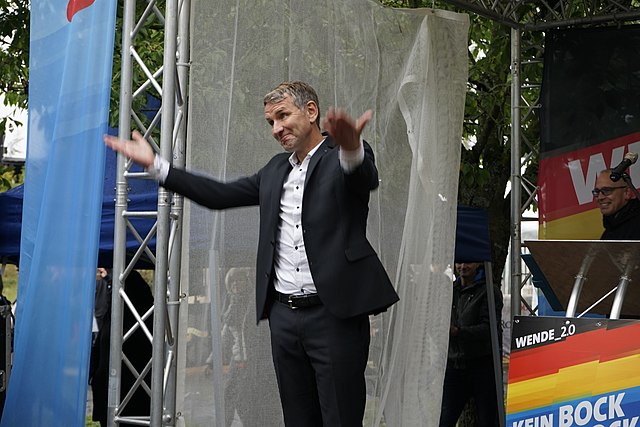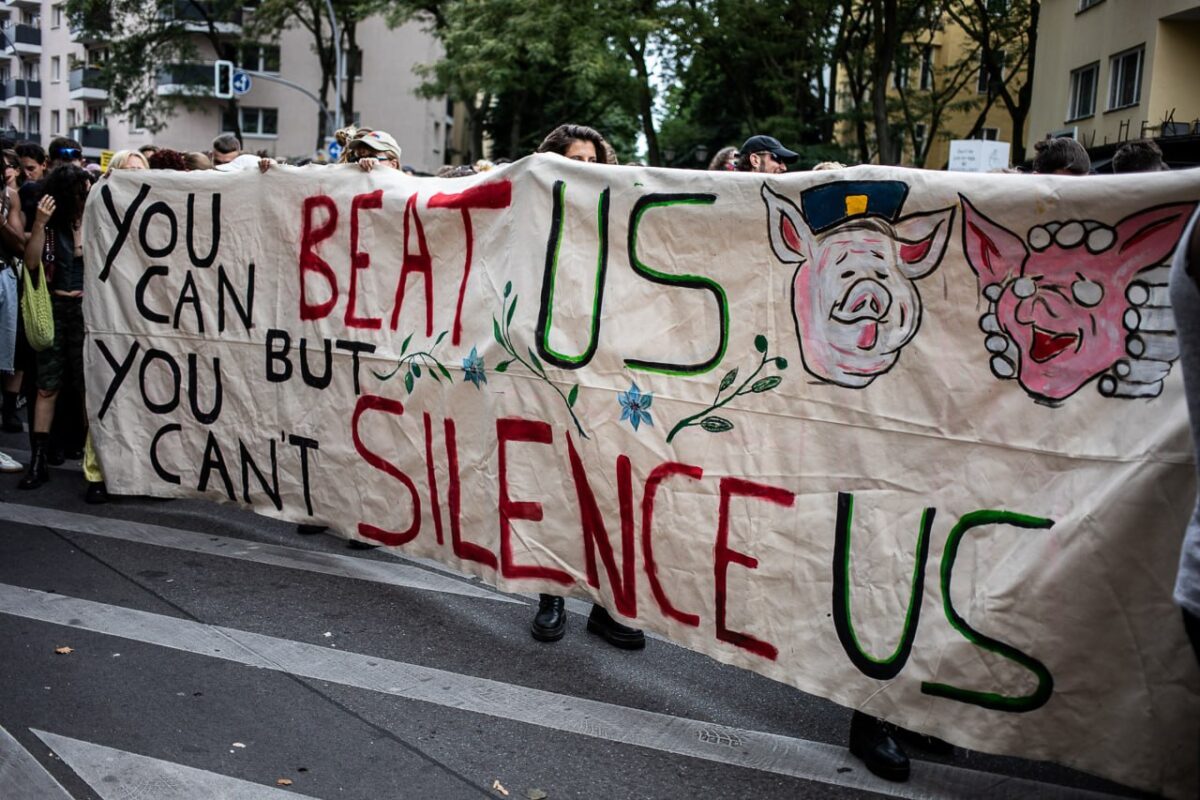This month, the Alternative for Germany (AfD) made history by winning its first state election in Germany. The party was led to success by Björn Höcke, a rising kingpin in the AfD. His influence has grown so much that the youth branch of the AfD, Junge Alternative (JA), once referred to themselves as the ‘Höckejugend‘. With a strong grass-roots following, Höcke has become one of the critical driving forces in the revival of the political far-right in Germany, and at his current trajectory, sights are set firmly on party leadership and even the Chancellorship.
Höcke positions himself as a radical alternative to the ‘theatre politics’ of Germany’s centrist parties, while the AfD’s politics are rather a copy-paste smorgasbord of ideas shared by other populist far-right movements in Europe, including Euroscepticism, pro-Russian sentiment, anti-immigration and anti-Muslim views. What particularly distinguishes Höcke within the AfD is his extremism, characterised by a focus on historical revisionism and his nationalist agenda.
History
Born in 1972 in the Ruhr region, his family moved to rural Germany to enjoy “a quiet country life”. His own mother describes his school years as rather typical, boisterous and at times outspoken, with frequent challenges to authority. Already at the age of 14, he was politically active, briefly joining the Junge Union, the youth organisation of the CDU/CSU coalition, but quickly became dissatisfied with the “career politician” approach he witnessed there.
Höcke was deeply politicised by his family, recounting how his grandparents inspired him with stories of their homeland in East Prussia. History is a key component of Höcke’s identity and politics, later studying it at university and then becoming a history teacher in 2004. In his own words:
“But politics could not be escaped there either … Every day, I was confronted with the terrible consequences of absurd ideology projects such as ‘multiculturalism’ and ‘inclusion’”
He proudly notes that he shares the same birthday as Otto von Bismarck, the infamous Prussian leader who unified Germany through military power and shrewd politics, consolidating state control and elevating the German empire into a global superpower. Given the AfD’s strong anti-multicultural stance, it’s noteworthy that 19th century East Prussia was a testing ground for the German Empire’s “Germanization” policies, designed to assimilate non-German ethnic groups by promoting German culture and settling ethnic Germans in the region. Höcke claims that sharing a birthday with Bismarck strengthens his “commitment to orient (himself) to his stately size and his love for the country and people”.
Bismarck was also used by the Nazis as a symbol of German nationalist ideals: a strong, decisive leader, a defender of the traditional order, a unified national identity and culture. For Höcke, this period of German history is particularly significant, as he believes it allows modern nationalists to draw pride from a time unburdened by the guilt narratives tied with WW2 and the Holocaust.
When the AfD was founded in late 2012, Höcke quickly took steps to quit his job as a teacher and by April 2013 he had co-founded a regional branch in Thuringia. His efforts paid off when, by autumn 2014, the AfD secured 10.6% of the vote, gaining seats in the state parliament. By 2019, support for the AfD in Thuringia had nearly doubled, with the party receiving 23.4% of the vote.
Meanwhile, in 2015, Höcke co-founded Der Flügel, a radical ethno-nationalist faction of the AfD, self-described as a “resistance movement against the further erosion of the identity of Germany”, who widely adopted racist, Islamophobic, antisemitic, xenophobic, revisionist and denialist discourse. In March 2020, Der Flügel was officially classified by the German state as a right-wing extremist organisation, after which the Chief of the Federal Office for the Protection of the Constitution(BfV) described right-wing extremism as “the biggest threat to German democracy”. This made the leaders of the AfD pressure Höcke to dissolve Der Flügel, avoiding the entire party being banned outright. Controversially however, its founding members, including Höcke, were not asked to leave the party.
Banned Speech
After the classification of Der Flügel as an extremist group, the BfV began monitoring Höcke, considering him a danger to German democracy. Since then, he has repeatedly been fined for using a banned slogan, firstly during a party campaign speech in 2021 and again in December last year where he also encouraged the audience to join. He was fined €13,000 & €16,900 respectively for using the phrase “Alles für Deutschland!” (“Everything for Germany!”), a slogan used by Hilter’s SA Stormtroopers, and engraved on their service daggers. Höcke, the history graduate and history teacher of 10 years, claimed he didn’t know the historical significance of the term, the same excuse used by fellow AfD party & Bundestag Member in 2020, and yet another AfD politician in 2017.
However, the slogan is seemingly a favourite for the AfD. Shamelessly dancing around the edges of banned speech, “Alice für Deutschland” was encouraged by AfD event moderators, written on banners and chanted by AfD supporters at a rally in Freiberg this year, in support of Alice Weidel, chairwoman of the AfD, who has also since joked that Höcke was saying “Alice” not “Alles”. To some, this is a harmless statement of patriotism, to others an undeniable dog whistle signifying the party’s true radical agenda.
Höcke has previously criticised German hate speech laws as limiting free speech. A similar sentiment was expressed this year in a Twitter discussion with Elon Musk stating: “Germany is at the forefront of persecuting political opponents and suppressing free speech” on X. Elon Musk, X (Twitter) owner, replied by asking why that slogan was illegal in Germany. Höcke replied, “Because every patriot in Germany is defamed as a Nazi”.
Historical Revisionism
Höcke’s family influence is further evident in his other views, as it was revealed that his father subscribed to the Holocaust denial & revisionist literature. In 2017, Höcke spoke to the AfD youth faction, Junge Alternative (JA), in Dresden about Germany’s remembrance culture:
“We Germans are the only people in the world who have planted a memorial of shame in the heart of their capital”.
He went on by stating:
“This stupid coping policy is still paralysing us today. We need nothing other than a 180-degree turnaround in remembrance policy. We don’t need any more dead rites”.
Although later distancing himself from this sentiment, the intentional ambiguity, spoken in a neo-Nazi hotspot, clearly intended to provoke revisionist fantasies. Dresden is seen as a flash-point for victimisation narratives (i.e. that Germany was also a victim of the Second World War), and the AfD frequently commemorates the anniversary of the Allied bombing of Dresden. Furthermore, Höcke believes:
“It should be reported to the same extent that the Americans starved German prisoners of war in the prison camps in the Rheinauen after the end of the Second World War.”
Later that same year, in an interview with the Wall Street Journal, Höcke continued his desire to discard the country’s historical guilt and pleaded for a more positive representation of Adolf Hilter, stating:
“Not everything was bad… The big problem is that Hitler is portrayed as absolutely evil. But of course, we know that there is no black and white in history.”
An Eco-Fascist Future?
One final note is evidence of the prerequisites to eco-fascism in Höcke’s rhetoric. Whilst the AfD is filled with climate denialists, Höcke has shown public support for Die Kehre magazine, which tries to reclaim left-wing environmentalism by rebranding “Klimaschutz” as “Heimatschutz”. His personal website also goes to great lengths to paint a picture of a grounded, nature-loving, everyday man, who is nevertheless willing to defend himself, if necessary.
Outro
What is dangerous about Höcke is perhaps less his ideas, but rather how toothless the institutional antifascist mechanisms in Germany seemingly are. The so-called “defensive democracy” policies of the modern German state seek to protect the state from descending back into nazism. Let’s see how Höcke checks up with the Verfassungsschutz:
- Surveillance by the state ✅
- Fines for usage of banned speech ✅
- Banning of extremist groups ✅ (Der Flügel dissolved prior to a ban)
- Revoking political financing …
- Prison sentences …
At this point, we have to ask what the red line is for Germany and Höcke. Is it already too late? After all, Hitler was democratically elected into power.
Until the root causes of extremism are addressed, and the needs of the left-behind seeking a different politics are addressed, right-wing extremism will continue to flourish in Germany.




